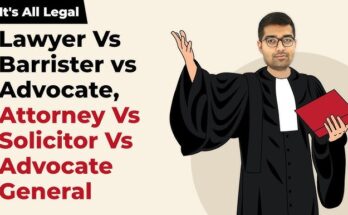Civil Law vs. Common Law The legal systems of the UK, USA, and Germany are shaped by two distinct traditions: common law and civil law. These systems influence the roles, training, and functions of lawyers in each country. The UK and USA operate under common law systems, while Germany follows a civil law framework. This article explores the differences between civil law and common law and examines the types of lawyers in the UK, USA, and Germany, highlighting their roles, qualifications, and specializations.
Civil Law vs. Common Law: An Overview
Common Law
Common law, prevalent in the UK and USA, is rooted in judicial precedents established by court decisions. Judges interpret and apply laws based on previous rulings, creating a body of case law that guides future decisions. This system emphasizes flexibility and the role of judges in shaping legal principles. Key features include:
- Precedent-Based: Courts rely on stare decisis, meaning they follow prior judicial decisions.
- Adversarial System: Lawyers advocate for their clients, and judges act as neutral arbiters.
- Evolving Law: Case law evolves through judicial interpretation, supplementing statutes.
Civil Law
Civil law, as practiced in Germany, relies on codified statutes and comprehensive legal codes. Judges apply these codes to cases, with less emphasis on judicial precedent. This system prioritizes predictability and uniformity. Key features include:
- Codified Laws: Legal rules are outlined in detailed statutes, such as Germany’s Bürgerliches Gesetzbuch (BGB).
- Inquisitorial System: Judges take an active role in investigating facts, with lawyers assisting rather than driving the process.
- Statutory Focus: Precedents exist but are less binding than in common law systems.
These distinctions shape the roles and training of lawyers in each country, as outlined below.
Types of Lawyers in the UK
The UK, specifically England and Wales, operates a common law system with a split legal profession, dividing lawyers into solicitors and barristers. Scotland and Northern Ireland have their own systems, but this section focuses on England and Wales, with notes on Scotland where relevant.
Solicitors
- Role: Solicitors are the primary point of contact for clients, providing legal advice, drafting documents, and handling non-litigation matters like contracts, wills, or property transactions. They may represent clients in lower courts (e.g., magistrates’ courts) but typically brief barristers for higher court advocacy.
- Qualifications: Solicitors must hold a law degree or a non-law degree plus a Graduate Diploma in Law (GDL). They complete the Legal Practice Course (LPC) or, since 2021, the Solicitors Qualifying Examination (SQE), followed by two years of qualifying work experience. They are regulated by the Solicitors Regulation Authority (SRA).
- Specializations: Solicitors often specialize in areas like:
- Family Law: Divorce, custody, prenuptial agreements.
- Commercial Law: Corporate contracts, mergers, intellectual property.
- Criminal Law: Advising clients before trial or in lower courts.
- Property Law: Conveyancing, real estate disputes.
- Accreditations: Many solicitors pursue accreditations, such as Law Society panels or Resolution membership for family law specialists.
- Scotland: In Scotland, solicitors perform similar roles but operate under Scots law, a hybrid of common law and civil law. They may also represent clients in court more frequently than in England.
Barristers
- Role: Barristers specialize in courtroom advocacy, representing clients in higher courts (e.g., Crown Court, High Court). They are typically briefed by solicitors and provide expert legal opinions or conduct litigation.
- Qualifications: Barristers need a law degree or GDL, followed by the Bar Professional Training Course (BPTC) and a pupillage (one-year apprenticeship). They are regulated by the Bar Standards Board (BSB).
- Specializations: Barristers focus on advocacy and often specialize in:
- Criminal Law: Defending or prosecuting in criminal trials.
- Civil Law: Handling disputes like personal injury or contract breaches.
- Chancery Law: Trusts, estates, and complex financial matters.
- Scotland: In Scotland, advocates perform roles similar to barristers but are trained in Scots law and regulated by the Faculty of Advocates.
Other Roles
- In-House Counsel: Lawyers working within companies, advising on legal compliance and contracts.
- Paralegals: Non-qualified legal professionals assisting solicitors with research or administrative tasks.
- Legal Executives: Chartered Legal Executives (regulated by CILEX) handle specific areas like conveyancing or probate, with limited court representation rights.
Types of Lawyers in the USA
The USA operates a common law system with a unified legal profession, where lawyers (often called attorneys) are licensed to practice in specific states. There’s no formal split like the UK’s solicitors and barristers, though functional specializations exist.
General Practice Attorneys
- Role: Some attorneys handle a broad range of legal matters, especially in small firms or rural areas. They advise clients on issues like wills, small business contracts, or minor criminal cases.
- Qualifications: Attorneys must hold a Juris Doctor (JD) degree from an accredited law school and pass the bar exam in their state. They are regulated by state bar associations, such as the California Bar or New York Bar.
- Use Case: Common in smaller communities where clients need versatile legal support.
Litigation Attorneys
- Role: These attorneys focus on representing clients in court, handling trials, appeals, or dispute resolution. They operate in an adversarial system, advocating for clients before judges or juries.
- Specializations:
- Criminal Defense/Prosecution: Defending clients in criminal cases or prosecuting on behalf of the state (e.g., district attorneys).
- Civil Litigation: Handling disputes like personal injury, medical malpractice, or employment law.
- Appellate Lawyers: Specializing in appeals, drafting briefs, and arguing before higher courts.
- Qualifications: Same as general attorneys, with additional trial experience or certifications (e.g., board certification in trial advocacy).
Transactional Attorneys
- Role: These lawyers focus on non-litigation work, such as drafting contracts, advising on mergers, or handling real estate transactions.
- Specializations:
- Corporate Law: Advising on mergers, acquisitions, or corporate governance.
- Intellectual Property (IP) Law: Managing patents, trademarks, or copyrights.
- Tax Law: Handling tax planning or disputes with the IRS.
- Qualifications: Often requires expertise in specific regulations, with some attorneys holding additional credentials like an LLM in taxation.
Public Interest Lawyers
- Role: These attorneys work for non-profits, legal aid organizations, or government agencies, representing underserved clients or advocating for public policy.
- Examples: Legal Services Corporation attorneys, public defenders, or lawyers at organizations like the ACLU.
- Qualifications: Same as other attorneys, often with a focus on pro bono work or public service.
In-House Counsel
- Role: Lawyers employed by corporations or organizations to handle legal matters like compliance, contracts, or employment issues.
- Qualifications: JD and bar admission, with experience in corporate or regulatory law.
Types of Lawyers in Germany
Germany’s civil law system shapes a unified legal profession, where lawyers, known as Rechtsanwälte, handle both advisory and litigation roles. Specialization is common, particularly through the Fachanwalt designation.
Rechtsanwälte
- Role: Rechtsanwälte provide legal advice, draft documents, and represent clients in court. They operate in an inquisitorial system, where judges play a more active role in fact-finding.
- Qualifications: Lawyers must complete a law degree (Erstes Juristisches Examen), followed by a two-year legal traineeship (Referendariat) and the Second State Examination (Zweites Juristisches Examen). They must register with a regional Rechtsanwaltskammer (bar association).
- Practice Areas: Rechtsanwälte may handle a wide range of cases, including:
- Civil Law: Contracts, property, or family disputes under the BGB.
- Criminal Law: Defending or prosecuting in criminal cases.
- Administrative Law: Disputes with government agencies, such as immigration or tax authorities.
Fachanwälte
- Role: A Fachanwalt is a Rechtsanwalt with specialized training and experience in a specific field. This designation requires additional coursework, exams, and a minimum number of cases in the specialty.
- Common Specializations:
- Fachanwalt für Arbeitsrecht: Employment law, handling workplace disputes or terminations.
- Fachanwalt für Familienrecht: Family law, including divorce and custody.
- Fachanwalt für Steuerrecht: Tax law, advising on tax planning or disputes.
- Fachanwalt für Handels- und Gesellschaftsrecht: Commercial and corporate law.
- Qualifications: Must be a Rechtsanwalt with at least three years of practice, followed by specialized training and casework.

Notaries (Notare)
- Role: Notaries in Germany have a distinct role, handling official acts like property transfers, wills, or corporate formations. Unlike Rechtsanwälte, they act as neutral public officials.
- Qualifications: Notaries undergo similar legal training but require additional appointments by the state. In some regions (e.g., Bavaria), notaries are separate from Rechtsanwälte, while in others (e.g., Berlin), lawyers may act as notaries.
- Use Case: Essential for legalizing documents or transactions requiring official certification.
In-House Counsel (Syndikusanwälte)
- Role: These lawyers work within companies, advising on compliance, contracts, or regulatory matters. Since 2016, they must also register with the Rechtsanwaltskammer.
- Qualifications: Same as Rechtsanwälte, with a focus on corporate law.
Key Differences Across Jurisdictions
| Aspect | UK (Common Law) | USA (Common Law) | Germany (Civil Law) |
|---|---|---|---|
| Legal Profession | Split: Solicitors and Barristers | Unified: Attorneys | Unified: Rechtsanwälte and Notaries |
| Court System | Adversarial | Adversarial | Inquisitorial |
| Specialization | Solicitors specialize; barristers focus on advocacy | Functional specialization (litigation, transactional) | Formal specialization via Fachanwalt |
| Regulation | SRA (solicitors), BSB (barristers) | State bar associations | Rechtsanwaltskammer |
| Training | LPC/SQE + work experience (solicitors); BPTC + pupillage (barristers) | JD + bar exam | Law degree + Referendariat + state exams |
| Notary Role | Minor, handled by solicitors or notaries public | Limited, varies by state | Significant, separate public official role |
Practical Implications for Choosing a Lawyer
- UK: Start with a solicitor for advice and document work. If your case goes to court, they may brief a barrister. Ensure the solicitor is SRA-registered and specializes in your issue (e.g., family or commercial law).
- USA: Choose an attorney licensed in your state with expertise in your case type. Check their bar status and disciplinary history via state bar websites. Specialization is key, especially for complex litigation or federal matters like immigration.
- Germany: Select a Rechtsanwalt with relevant experience or a Fachanwalt title for specialized cases. Verify their registration with the Rechtsanwaltskammer. For official acts like property transfers, you may also need a notary.
Conclusion
The common law systems of the UK and USA and the civil law system of Germany create distinct legal professions tailored to their respective frameworks. In the UK, the solicitor-barrister split emphasizes specialized roles, while the USA’s unified attorney system prioritizes state-specific expertise. Germany’s Rechtsanwälte and Fachanwälte operate within a codified, inquisitorial system, with notaries playing a unique role. Understanding these differences is crucial when selecting a lawyer, ensuring you choose one with the right qualifications, specialization, and approach for your legal needs. Whether navigating a divorce in London, a business dispute in New York, or a tax issue in Berlin, aligning your choice with the country’s legal system will lead to better outcomes.



